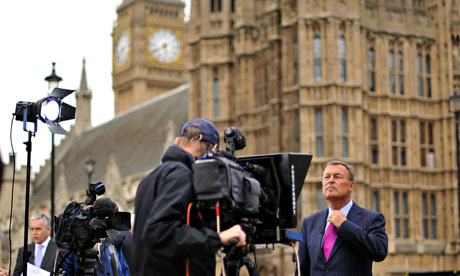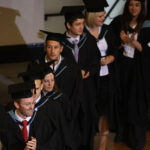Planning on boycotting the royal wedding? Avoiding all coverage of the big day? Well, short of taking yourself off to a remote island, sealing yourself in a darkened room or, say, climbing Ben Nevis, you might find it pretty tough.
The upcoming nuptials are set to become one of the biggest broadcasting events in history, with optimistic estimates suggesting up to 2 billion people will be watching the live coverage. Perhaps that remote island is out after all.
Joking aside, the royal wedding coverage is going to be rather impressive – in fact, London has never seen an outside broadcast like it. An estimated 8,000 TV and radio journalists and technical staff will be joining the throng of patriotic well wishers to compete for the best commentary, the long-awaited first glimpse of That Dress, and the most compelling human interest stories.
So, what’s it like reporting news which matters to millions? We’ll have to wait and see how presenters such as Philip Schofield and Fearne Cotton get on come 29 April, so instead I’ll share an insight from BBC special correspondent Richard Bilton, which featured in the Independent.
Richard says the high point of his career has been covering the foot-and-mouth crisis – he found it incredibly moving and rewarding getting involved with the communities touched by the outbreak. There’s also the unexpected to contend with though – once a car reversed into him during a live broadcast…
So, as well as being able to deal with on-air disasters, what does it take to make a living as a broadcast journalist? What types of training and qualifications do employers look for? We’re asking a panel of industry experts to share their advice in a live Q&A on 18 April between 1pm-4pm. Join us and post advance questions below.
To receive links to forthcoming Q&As direct to your inbox, sign up for our weekly Careers update.
Our panel:
We’ll be joined by two representatives of the Broadcast Journalism Training Council. Marie Kinsey is chair and also director of postgraduate journalism at the University of Sheffield. Steve Harris has worked as a journalist in print, radio and television and is currently accreditations secretary.
Sarah Jones is a lecturer in television journalism, working for The University of Salford at MediaCityUK. Sarah previously worked for GMTV and ITV as both a correspondent and news reader.
Jonathan Baker has been head of the BBC College of Journalism since March 2010, after a BBC career spent in network news. The College is responsible for the training of the BBC’s 8,000-plus journalists, and runs a training website which is available free to all UK internet users.
Matt Barbet presents Five News on Channel 5. After graduating from Cardiff University’s School of Journalism, Media and Cultural Studies more than a decade ago, Matt’s career began at ITN Radio before he moved to the BBC. In 2007, he moved to Channel 5.
Karen Fowler-Watt is associate dean, journalism and communication, at The Media School, Bournemouth University. Karen is a former BBC journalist and also a council member of the Broadcast Journalism Training Council.
Deborah Robinson is a senior lecturer in broadcast journalism and course leader for the BA Honours Journalism programme at the University of Central Lancashire.
Rachael Dry is a freelance broadcast journalist for commercial and BBC radio stations and a communications consultant in the public and private sectors.
Carole Fleming is the deputy director at the Centre for Broadcasting and Journalism at Nottingham Trent University. Before going into teaching, Carole worked in regional newspapers and both commercial and BBC radio.
Maryam Nemazee is the anchor of Bloomberg Television’s The Pulse with Maryam Nemazee, a daily programme tracking the big economic and financial developments of the day from around the globe.
Lis Howell is director of broadcasting and head of the MA courses in broadcast and television journalism at City University London.
George Matheson is an award-winning journalist with more than 20 years experience at a local, national and international level in newspapers, radio and television. He is currently programme leader for the MA International Journalism at University College Falmouth.
Sandy Warr is joining us from 1pm-2pm. Sandy has worked in radio for 25 years and is a visiting lecturer on broadcast courses at City University and Westminster University.










